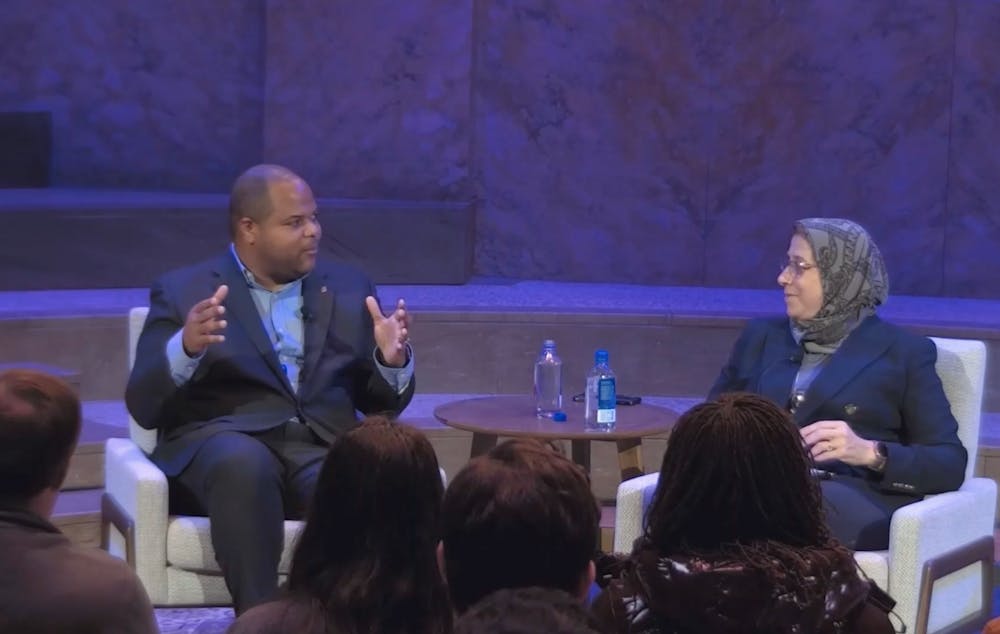As discussions continue on public service and the School of Public and International Affairs (SPIA), Eric Johnson GS ’03, mayor of Dallas, TX, discussed the virtues of serving in public office, the benefits of a SPIA education, and the challenges faced by local and state governments at an event held at Richardson Auditorium and moderated by Dean Amaney A. Jamal.
The event was the third-ever Life and Leadership keynote, held annually during Wintersession to feature distinguished Princeton alumni. The event was also sponsored by the Office of Campus Engagement (OCE).
Johnson, a graduate of the Master of Public Policy program at SPIA, is the 60th mayor of Dallas and served in the Texas House of Representatives from 2010–2019.
Johnson explained that his path to politics was atypical, as he grew up in a “pretty rough neighborhood.” He said that his goals were to fulfill the aspirations of his parents and grandparents, which involved him attending college and becoming self-sufficient.
He ultimately ran for state representative because he was “unhappy” with the situation with his local representative at the time, who was facing allegations of corruption during the election and was later found guilty by the federal government for misrepresenting her tax return. However, as Johnson described, he received limited support during his campaign and was discouraged from running, as some party leaders declined to support a primary challenge before the incumbent resigned or was found guilty.
Johnson said he shared this anecdote to emphasize that “we can do a better job across the board in identifying talented people with a good heart to serve the public.”
Johnson’s visit comes as survey data shows only 7 percent of 2022 graduates went on to work in the public sector. Both Jamal’s and audience members’ questions highlighted the deterrents to current SPIA students seeking to run a campaign — the influence of money in politics, the rigors of public life, political gridlock, and the desire to make change through other avenues.
“People are taking their talents into business, higher education, when I could use them in my city council, in the city manager’s office, in state legislatures and governors’ mansions,” Johnson said.

The necessity of more talent in public office was a consistent theme emphasized by Johnson, who said that America’s “body politic is suffering from talent on the input side, and it is affecting the output side.”
“People with low integrity and people who see the job as a hustle or do it for some notoriety to gain attention have always been prevalent — Donald Trump wasn’t first — but we have now reached stage-four cancer. We don’t have enough people with the training or integrity, and it really scares and concerns me,” he said.
Johnson said that fewer individuals today view public service as honorable work and as their life’s calling than they did in the past.
“I never needed convincing that public service was worth my time. People in public service overall were noble and doing a good thing, so I may be out of step generationally because I didn’t need to be convinced of it,” he said.

He further stressed the importance of participating in local politics.
“If you’re thinking about public office, go into local politics. That is where change is made. Federal government has stopped making policy. Congress is in perpetual campaign commercial mode. But we still have to address homelessness, make sure people have parks and places to live. We are taking care of the nuts and bolts of what makes [these] places function.”
According to Johnson, however, even local politics aren’t immune to partisan gridlock. After nine years as a Democrat in the Republican-dominated Texas House, Johnson was exhausted by the polarization that had “gripped” his colleagues — “to the point where a good idea couldn’t be recognized as a good idea if it was coming out of the wrong mouth.”
Johnson is the second Black mayor of Dallas, and though he joked that “no one cares about the second,” he explained that his election meant something personally, because he is a product of Dallas’s Black community, whereas the first Black mayor was raised in Austin, not Dallas. He also said that there is something special in being second — it gives the impression that it isn’t out of the norm to have a Black mayor and that it should be ordinary.
Johnson said that what he loved most about his time at SPIA was the people he met.
“There were no barriers between students, professors, and administrators,” he said. He told the audience about his frequent Hoagie Haven visits with (former) admissions officer John Templeton during his time at SPIA.
Johnson was attracted to SPIA because of the quantitative aspect of the program, and it set the basis for how he approached his job — in a “technocratic instead of political way.”
He continued that it was because of this approach that he “assesses overall outcomes in order to maximize the public benefit,” instead of typical considerations made by politicians, such as which district the issue is in and whether addressing it will help them in reelection.
Johnson said he used the quantitative approach that he learned at SPIA in his policy solutions as a Texas House Representative regarding education and police-community relations.
“In order to move a problem forward, we need to actually convince people there is a problem, which means we need to actually collect the data,” he explained.
Johnson closed by reflecting on an important quality he observes in successful politicians.
“Deep down inside, no one really likes a coward, and sadly, to a certain degree, Trump tapped into that natural affinity people have towards a confidence and strength and belief in something. So if you have something you really want to get done, just be strong and go for it.”
Johnson’s office did not respond to The Daily Princetonian’s request for comment.
Abby Leibowitz is a News contributor for the 'Prince.'
Please direct any corrections requests to corrections[at]dailyprincetonian.com.








